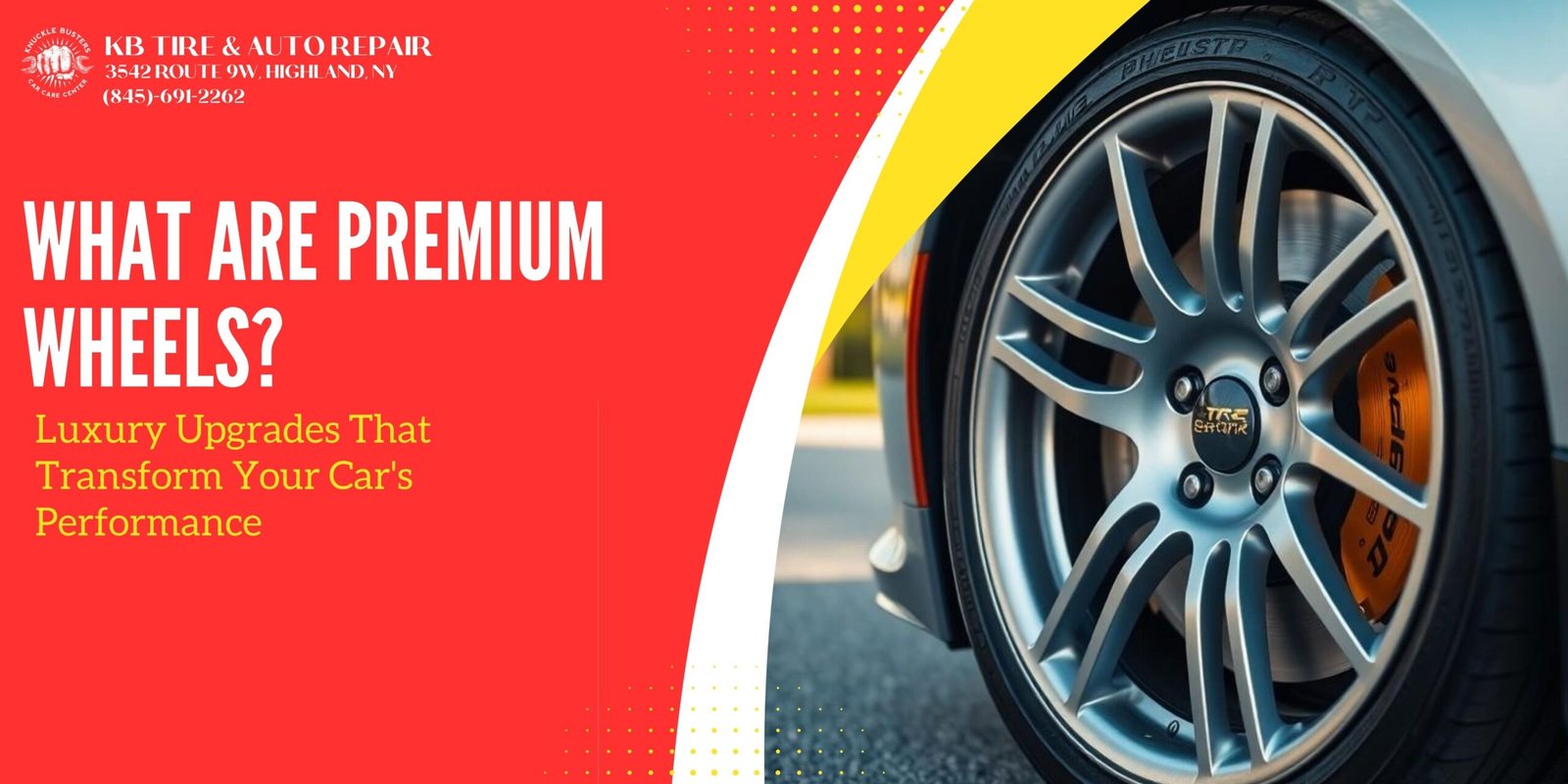Ever wondered why some vehicles turn heads while others blend into traffic? The secret might be rolling right beneath them. Premium wheels aren’t just functional components—they’re statement pieces that transform your ride’s entire aesthetic and performance.
You’ve likely noticed those sleek, eye-catching wheels on luxury vehicles that seem to command attention. These aren’t your standard factory-issued rims. Premium wheels represent the pinnacle of design, craftsmanship, and engineering excellence. Made from superior materials like forged aluminum or carbon fiber, they offer benefits beyond just looks—including improved handling, reduced unsprung weight, and enhanced driving dynamics.
What Are Premium Wheels: An Overview
Premium wheels represent the pinnacle of automotive wheel design and engineering, combining aesthetics with advanced performance characteristics. Unlike standard factory-installed wheels, premium wheels are crafted from high-grade materials such as forged aluminum, carbon fiber, or titanium alloys. These specialized wheels are designed for car enthusiasts who seek both enhanced visual appeal and superior driving dynamics.
The distinguishing features of premium wheels include:
- Superior materials – Constructed from lightweight yet durable components that outperform stock wheels in strength-to-weight ratio
- Precision engineering – Manufactured with tighter tolerances and advanced techniques like flow-forming or multi-piece construction
- Customized designs – Available in diverse styles, finishes, and dimensions specifically tailored to complement luxury and performance vehicles
- Enhanced performance – Engineered to improve handling, acceleration, braking, and fuel efficiency through reduced unsprung weight
Premium wheels from renowned manufacturers like BBS, HRE, Vossen, and Enkei typically cost between $300-$4,000 per wheel, reflecting their advanced materials and manufacturing processes. While standard wheels prioritize cost-effectiveness and practicality, premium options focus on optimizing both form and function for discerning drivers.
The market for premium wheels spans several categories, including luxury aesthetic upgrades, motorsport-inspired performance wheels, and off-road specialized designs. Each category serves specific purposes, from showcasing status and style to maximizing track performance or enhancing off-road capability.
Key Characteristics of Premium Wheels
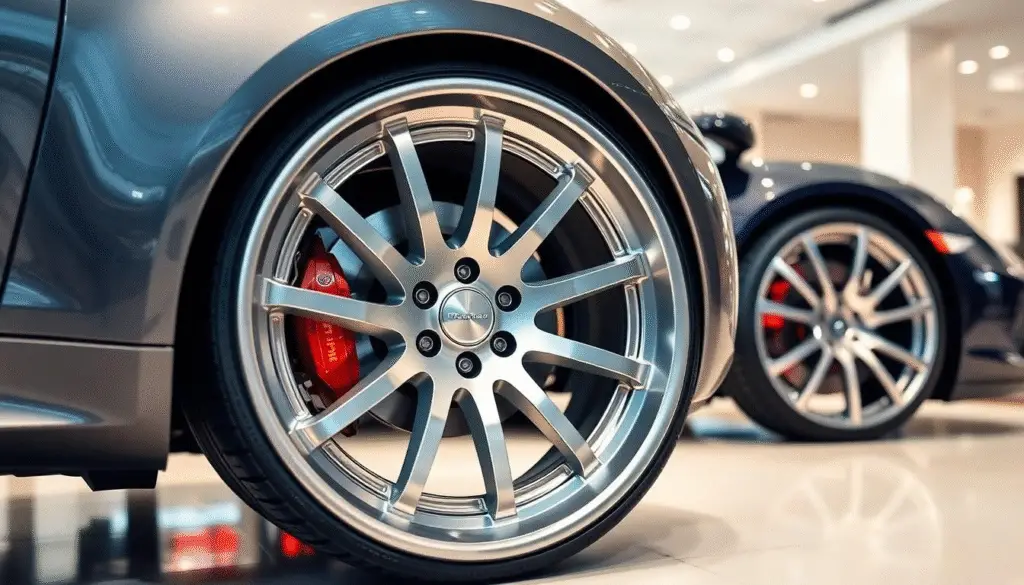
Premium wheels stand apart from standard options through distinctive qualities that justify their higher price points. These characteristics combine to create wheels that enhance both form and function for discerning vehicle owners.
Superior Materials and Construction
Premium wheels utilize exceptional materials that outperform standard alternatives in durability and weight efficiency. Forged aluminum creates wheels that are 25-40% lighter than cast counterparts while maintaining superior strength. High-end manufacturers like BBS and HRE employ multi-stage forging processes that compress aluminum at pressures exceeding 6,000 tons, eliminating microscopic air pockets and creating a denser, more resilient structure. Other premium options include magnesium alloys that reduce weight by up to 30% compared to aluminum, and carbon fiber composites that provide remarkable strength-to-weight ratios in ultra-premium applications.
The construction methods for premium wheels include flow-forming, rotary forging, and multi-piece assembly techniques. Flow-formed wheels undergo a spinning process that stretches and compresses the aluminum, creating stronger molecular bonds in the barrel section. Multi-piece wheels, consisting of separate centers, barrels, and lips, allow for custom widths, offsets, and intricate designs unachievable with one-piece construction. These sophisticated manufacturing techniques result in wheels that maintain dimensional accuracy within 0.01mm tolerances, ensuring perfect balance and minimizing vibration.
Enhanced Design and Aesthetics
Premium wheels offer distinctive design elements that transform a vehicle’s appearance with sophisticated visual impact. Concave profiles create depth and dimensional presence, while contrasting machined faces with painted recesses highlight intricate spoke patterns. Many premium wheel designs feature custom finish options including diamond-cut faces, ceramic polished edges, and multi-stage painting processes unavailable on standard wheels.
Customization represents a defining characteristic of premium wheels, with manufacturers offering personalized options for discerning buyers. You’ll find configurable specifications including bolt patterns, offsets, and center bore dimensions to ensure perfect fitment on specific vehicles. Some high-end manufacturers provide up to 40 different finish options, creating truly bespoke wheels that complement your vehicle’s color and styling elements. This level of attention to detail extends to branded center caps, valve stems, and optional titanium or lightweight steel hardware that completes the premium wheel aesthetic.
Benefits of Premium Wheels
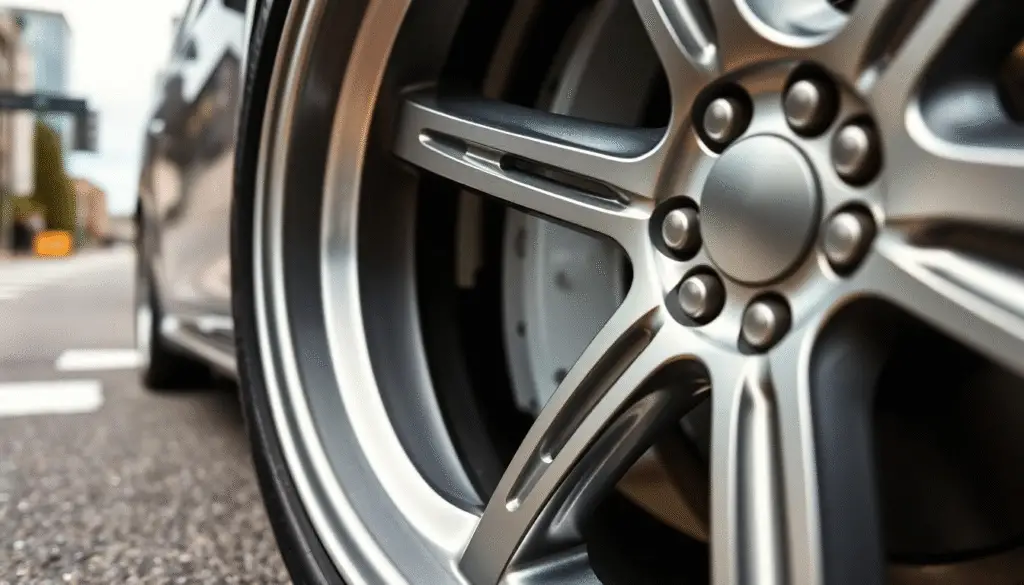

Premium wheels deliver substantial advantages beyond mere aesthetics, offering tangible improvements to your driving experience. These high-end wheel options transform both how your vehicle performs and how long your wheels last compared to standard factory options.
Performance Advantages
Premium wheels enhance your vehicle’s handling capabilities through precision engineering and optimized design. The reduced unsprung weight of forged aluminum or carbon fiber wheels allows your suspension to react more quickly to road imperfections, providing more responsive steering and improved grip during cornering. High-quality premium wheels distribute heat more efficiently, reducing brake temperatures by up to 15% during aggressive driving, which minimizes brake fade on demanding roads. The aerodynamic properties of premium wheels also contribute to increased fuel efficiency, with some designs reducing drag coefficients by measurable amounts. Premium wheels often feature wider dimensions that accommodate larger, high-performance tires, increasing your contact patch with the road for superior traction during acceleration, cornering, and braking.
Durability and Longevity
Premium wheels outperform standard wheels in longevity metrics due to superior material composition and manufacturing processes. The high-grade alloys used in premium wheels, including 6061-T6 aluminum and aircraft-grade materials, resist corrosion from road salt and environmental factors more effectively than mass-produced alternatives. The precise manufacturing tolerances (within 0.01mm) ensure true rotation without vibration, reducing wear on suspension components and bearings over time. Premium wheels typically maintain structural integrity after impacts that would crack or bend standard wheels, saving replacement costs and maintaining safety. The specialized protective coatings applied to premium wheels, such as diamond-cut faces with clear protective finishes, resist curb rash and environmental damage for years longer than standard paint applications. Many premium wheel manufacturers offer extended warranties ranging from 3-5 years compared to the standard 1-year coverage on factory wheels, reflecting their confidence in product durability.
Popular Premium Wheel Brands
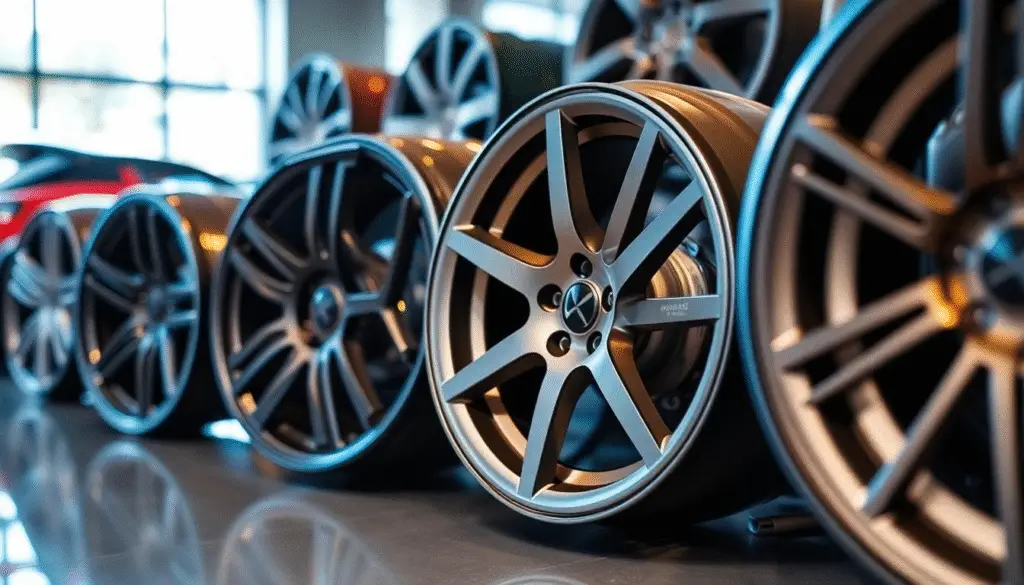
Premium wheel brands stand at the forefront of automotive wheel innovation, combining cutting-edge technologies with luxury aesthetics. These manufacturers have established reputations for excellence that car enthusiasts trust for their vehicles.
Luxury Automotive Wheel Manufacturers
Luxury automotive wheel manufacturers create products specifically designed for high-end vehicles, often partnering directly with premium car brands. BBS, founded in 1970, is renowned for its lightweight racing wheels featured on prestigious marques like Porsche and BMW. HRE Performance Wheels crafts custom forged wheels with precision engineering, offering three-piece designs that accommodate large brake systems on luxury sports cars. Vossen produces wheels with distinctive contemporary styling and maintains tolerances within 0.005 inches, making them popular choices for Mercedes-Benz and Audi models. ADV.1 focuses on fully customizable luxury wheels with over 72 finish combinations and proprietary lightweight construction techniques. OZ Racing, with Italian heritage dating back to 1971, supplies wheels to Formula 1 teams and produces consumer versions featuring similar technologies.
Aftermarket Premium Options
Aftermarket premium wheel options extend beyond factory offerings with unique designs and specialized performance characteristics. Avant Garde produces sophisticated concave wheels starting at $400 per wheel, featuring flow-formed construction that reduces weight by 15% compared to cast alternatives. Rays Engineering, a Japanese manufacturer, offers the iconic Volk Racing TE37 wheels favored by performance enthusiasts for their 6-spoke design and weight savings of up to 4 pounds per corner. Rotiform specializes in statement wheels with bold, intricate designs and custom fitments, offering both cast and forged options across 14 distinct collections. Work Wheels Japan creates premium three-piece forged wheels with hand-polished lips and customizable center sections, allowing for extreme width specifications up to 13 inches. American Racing offers heritage-inspired designs with modern construction techniques, including their forged VF series that combines classic styling with contemporary performance benefits.
Cost Considerations for Premium Wheels
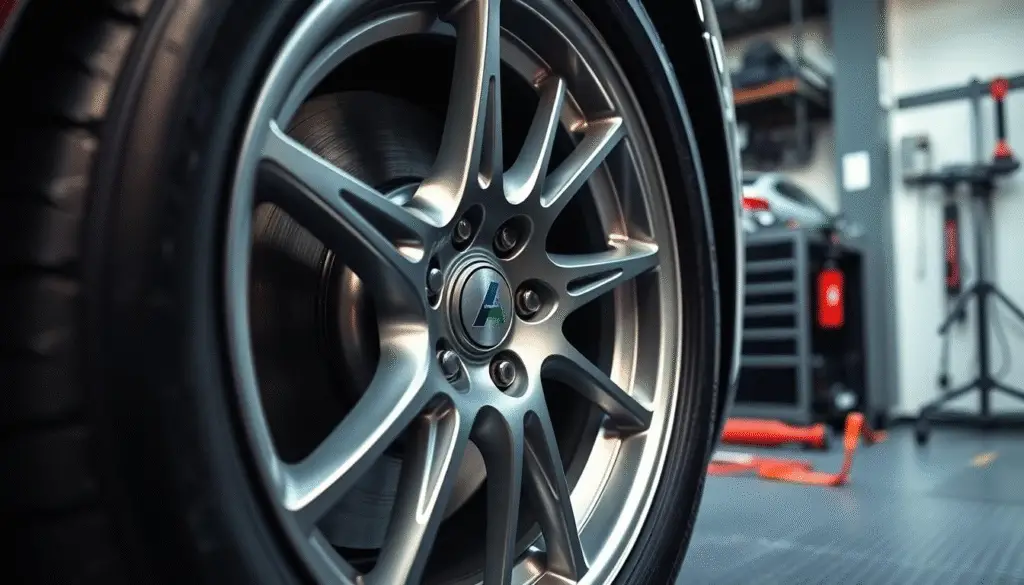
Premium wheels represent a significant investment compared to standard factory options, with pricing that reflects their superior materials and craftsmanship. Understanding the financial implications helps you make informed decisions when upgrading your vehicle’s wheels.
Initial Investment vs. Long-Term Value
Premium wheels typically cost between $300 and $4,000 per wheel, depending on size, material, and brand reputation. High-end forged wheels from manufacturers like HRE or ADV.1 command higher prices due to their lightweight properties and manufacturing complexity. While standard cast aluminum wheels might cost $150-$200 each, premium wheels require a substantially larger upfront investment.
This price difference is justified through tangible long-term benefits. Premium wheels maintain their structural integrity longer than standard options, often lasting through multiple vehicles with proper care. Their resistance to corrosion and impact damage reduces replacement frequency, spreading the cost over a longer timeframe. Additionally, many premium wheels hold their value exceptionally well, with some limited-edition designs even appreciating over time.
The performance advantages of premium wheels—improved fuel efficiency, reduced tire wear, and enhanced handling—also contribute to their long-term value proposition. A set of quality forged wheels might save 1-2% in fuel consumption through weight reduction, adding up to meaningful savings over 50,000+ miles of driving.
How to Choose the Right Premium Wheels
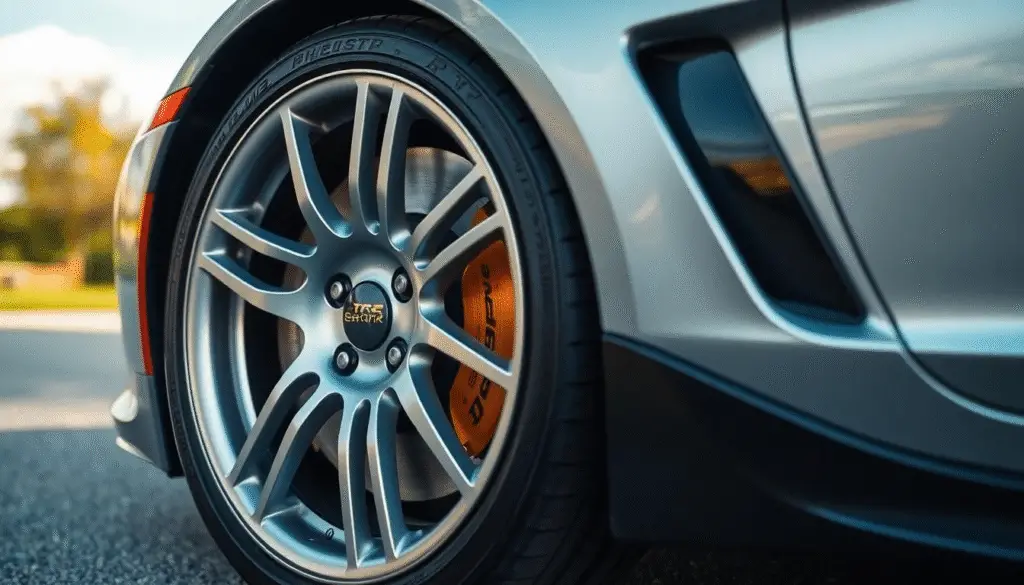
Selecting the perfect premium wheels for your vehicle isn’t just about aesthetics—it’s a balance of compatibility, style, and performance. The right premium wheels complement your car’s design while enhancing its driving characteristics and maintaining safety standards.
Vehicle Compatibility Factors
Premium wheels must match your vehicle’s specifications perfectly to ensure safe operation. Check your vehicle’s bolt pattern (lug nut configuration), center bore diameter, and offset measurements before purchasing. These specifications are typically found in your owner’s manual or can be verified using online fitment guides specific to your make and model. Premium wheels require precise compatibility—installing wheels with incorrect specifications can cause vibration, uneven tire wear, and compromised handling.
Load rating is another critical factor when choosing premium wheels. These ratings indicate the maximum weight each wheel can safely support. High-performance vehicles, SUVs, and trucks have different weight requirements, so select premium wheels with appropriate load ratings for your specific vehicle type. Many premium wheel manufacturers like HRE and BBS provide vehicle-specific applications to ensure perfect fitment.
Brake clearance must also be considered, particularly if you’ve upgraded to larger brake calipers. Premium wheels often accommodate performance brake systems better than standard wheels, but measurements should be verified before purchase. Some premium wheel manufacturers offer hub-centric designs that align precisely with your vehicle’s hub for vibration-free operation.
Style and Performance Balance
Premium wheels offer a perfect marriage of aesthetics and functionality. The design you choose reflects your personal style while impacting your vehicle’s performance characteristics. Concave designs, multi-spoke patterns, and split-spoke configurations are popular premium wheel styles that add visual depth to your vehicle’s appearance.
Wheel dimensions significantly affect both style and performance. Larger diameter wheels (18-22 inches) create a dramatic visual impact but may sacrifice some ride comfort. Width affects tire fitment and stance—wider wheels allow for wider tires, enhancing grip but potentially affecting fuel economy. Premium wheels often feature optimal weight distribution and aerodynamic designs that minimize performance compromises despite their enhanced aesthetics.
Finish options for premium wheels include brushed aluminum, diamond-cut faces, ceramic coatings, and custom color treatments. While these finishes enhance visual appeal, consider your maintenance commitment—some premium finishes require regular care to maintain their appearance. Performance-oriented premium wheels might feature specialized coatings that reduce brake dust accumulation or enhance heat dissipation during aggressive driving.
When balancing style and performance, consider your driving habits. If you frequently drive on challenging roads, lightweight forged premium wheels offer better performance benefits than heavier cast wheels, regardless of their appearance. Conversely, if your vehicle serves as a show piece, intricate multi-piece wheels with custom finishes might better serve your purposes despite their additional weight.
Conclusion
Premium wheels represent the perfect blend of art and engineering in the automotive world. They’re more than just accessories—they’re investments that transform both the look and performance of your vehicle.
When you choose premium wheels you’re opting for superior materials lighter weight better handling and distinctive aesthetics that set your car apart. Though they command higher prices the long-term benefits in durability performance and potential value appreciation make them worth considering.
Whether you prioritize the head-turning appeal of custom designs or the performance gains of reduced unsprung weight premium wheels deliver on multiple fronts. Finding the right balance between style compatibility and performance will ensure your premium wheel investment enhances your driving experience for years to come.
Frequently Asked Questions
What are premium wheels and how do they differ from standard wheels?
Premium wheels are high-end automotive wheels crafted from superior materials like forged aluminum, magnesium alloys, or carbon fiber. Unlike standard cast wheels, premium options feature precision engineering with tighter tolerances (within 0.01mm), advanced manufacturing techniques like flow-forming, and customizable designs. They’re lighter, stronger, and more durable than factory wheels, which translates to enhanced performance and aesthetics for luxury vehicles.
How much do premium wheels typically cost?
Premium wheels generally range from $300 to $4,000 per wheel, depending on materials, manufacturing process, and brand prestige. High-end forged wheels command higher prices due to their lightweight properties and complex manufacturing. This represents a significant premium over standard cast aluminum wheels, which typically cost $150-$200 each. The investment reflects their superior materials, precision engineering, and performance benefits.
What performance benefits do premium wheels provide?
Premium wheels deliver significant performance improvements through reduced unsprung weight, allowing for quicker suspension response and better grip. They enhance handling precision, especially during cornering and high-speed driving. Many designs also improve brake cooling and aerodynamics. The lightweight construction can boost fuel efficiency by 1-2% and reduce brake temperatures during aggressive driving, resulting in more responsive, efficient vehicle dynamics.
Which brands are considered leaders in premium wheels?
Leading premium wheel manufacturers include BBS, HRE Performance Wheels, Vossen, ADV.1, and OZ Racing for OEM collaborations. Respected aftermarket brands include Avant Garde, Rays Engineering, Rotiform, Work Wheels Japan, and American Racing. These companies distinguish themselves through innovative technologies, unique designs, and collaborations with luxury vehicle manufacturers to create wheels specifically engineered for high-performance applications.
How do I choose the right premium wheels for my vehicle?
Select premium wheels by ensuring proper compatibility with your vehicle’s specifications, including bolt pattern, center bore diameter, offset measurements, and load ratings. Balance aesthetic preferences with performance needs based on your driving habits. Consider wheel size and width impact on handling and ride comfort. Choose appropriate finishes based on your maintenance commitment and local climate conditions to maximize longevity and appearance.
Are premium wheels worth the investment?
Premium wheels justify their higher cost through superior durability, reduced replacement frequency, and potential appreciation for limited editions. Their lightweight construction improves fuel efficiency and reduces tire wear, offsetting initial costs over time. Beyond performance benefits, they significantly enhance vehicle aesthetics and can increase resale value. For enthusiasts who value both performance and appearance, premium wheels deliver long-term value despite the higher upfront investment.
What materials are used in premium wheel construction?
Premium wheels utilize exceptional materials including forged aluminum (for strength-to-weight ratio), magnesium alloys (25% lighter than aluminum), and carbon fiber composites (for ultimate weight reduction). These materials undergo specialized manufacturing processes like multi-stage forging under high pressure or carbon layup techniques. The result is wheels that maintain strength while significantly reducing weight compared to conventional cast wheels, directly improving vehicle performance.
How do premium wheels affect vehicle handling?
Premium wheels improve handling through optimized weight distribution and reduced rotational mass. The lighter construction allows suspension components to respond more quickly to road imperfections, maintaining better tire contact with the road surface. This translates to more precise steering response, improved cornering stability, and shorter braking distances. Many designs also enhance brake cooling, reducing fade during aggressive driving for consistent performance.
Related Posts:
